Abstract
The objectives of this study were to determine whether or not the probiotic Lactobacillus GG can colonise the immature bowel of premature infants and if so, does colonisation result in a reduction of the size of the bowel reservoir of nosocomial pathogens such as enterobacteriaceae, enterococci, yeasts or staphylococci, and does colonisation with Lactobacillus GG have any effect on the clinical progress and outcome. Twenty preterm infants with a gestational age of 33 weeks or less who were resident on a neonatal unit were studied from the initiation of milk feeds until discharge. The infants were randomised to receive either milk feeds or milk feeds supplemented with Lactobacillus GG 10(8) colony forming units twice a day for two weeks. The clinical features of the two groups of infants were similar. Orally administered Lactobacillus GG was well tolerated and did colonise the bowel of premature infants. However, colonisation with Lactobacillus GG did not reduce the faecal reservoir of potential pathogens and there was no evidence that colonisation had any positive clinical benefit for this particular group of infants.
Full text
PDF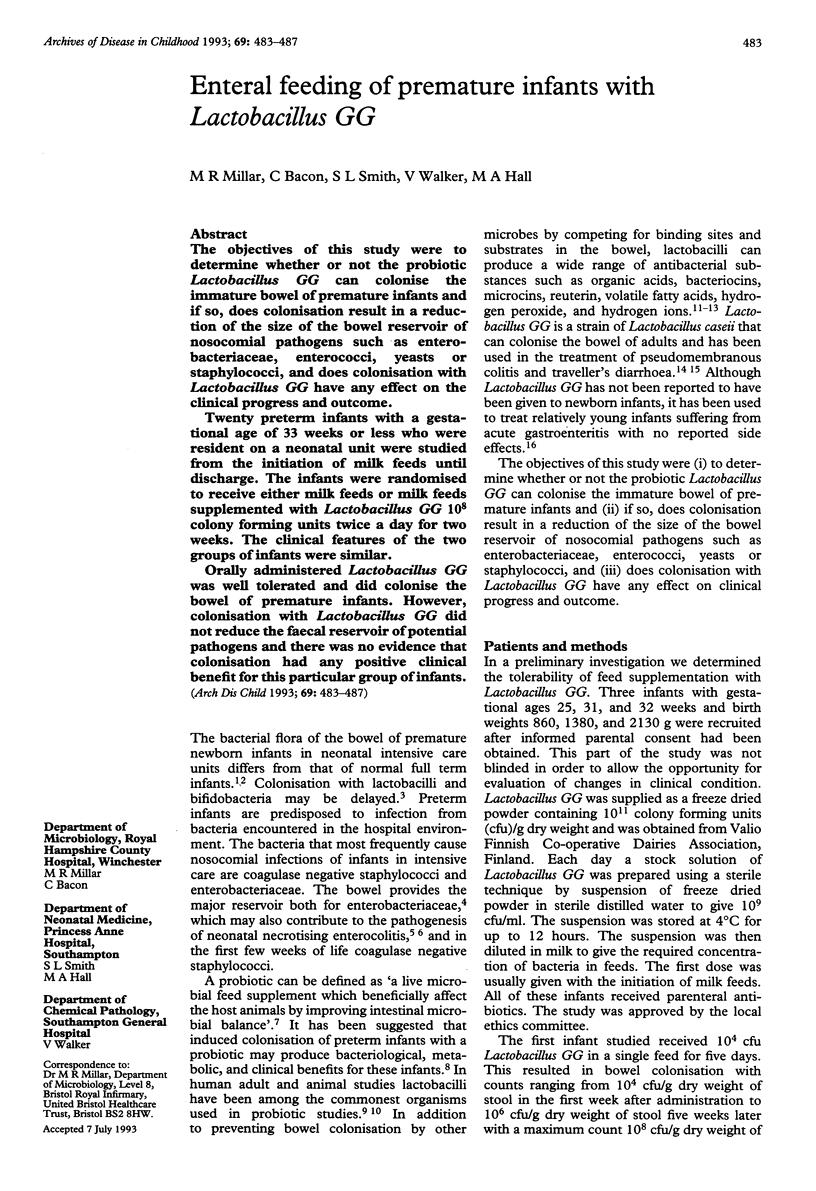
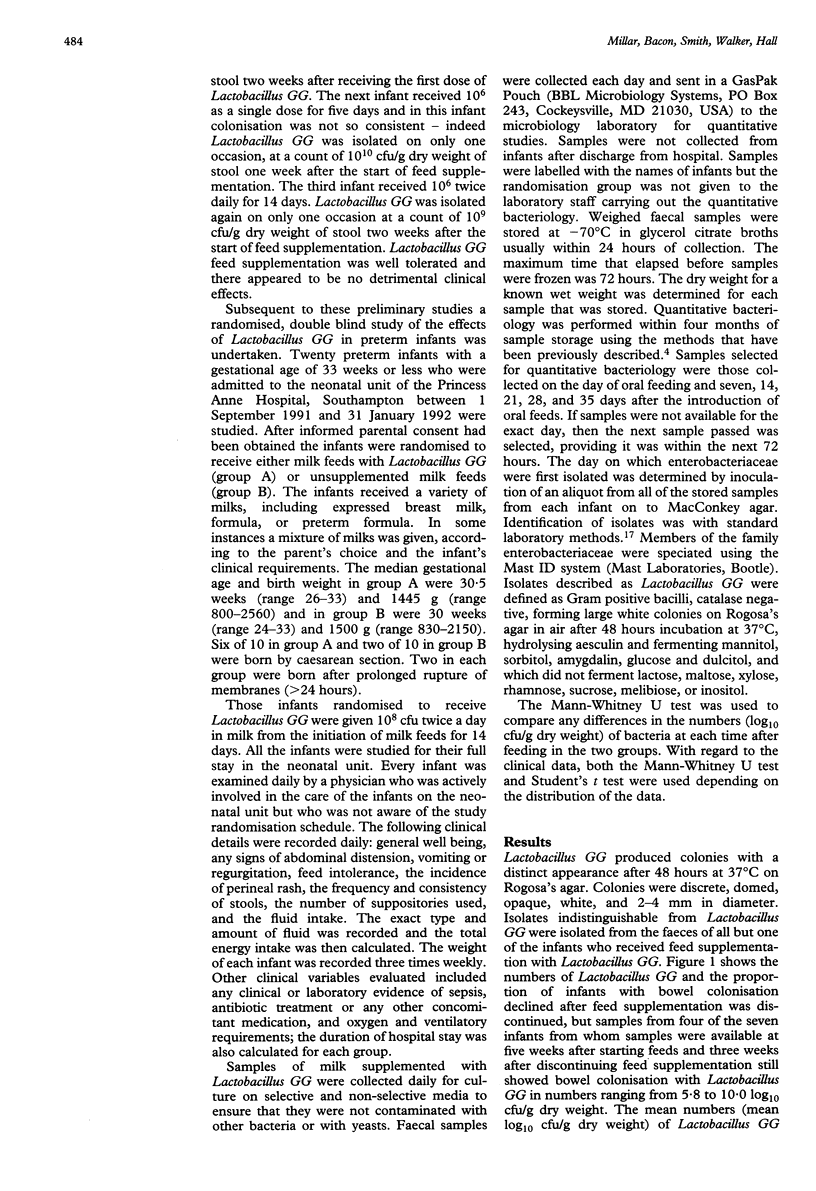
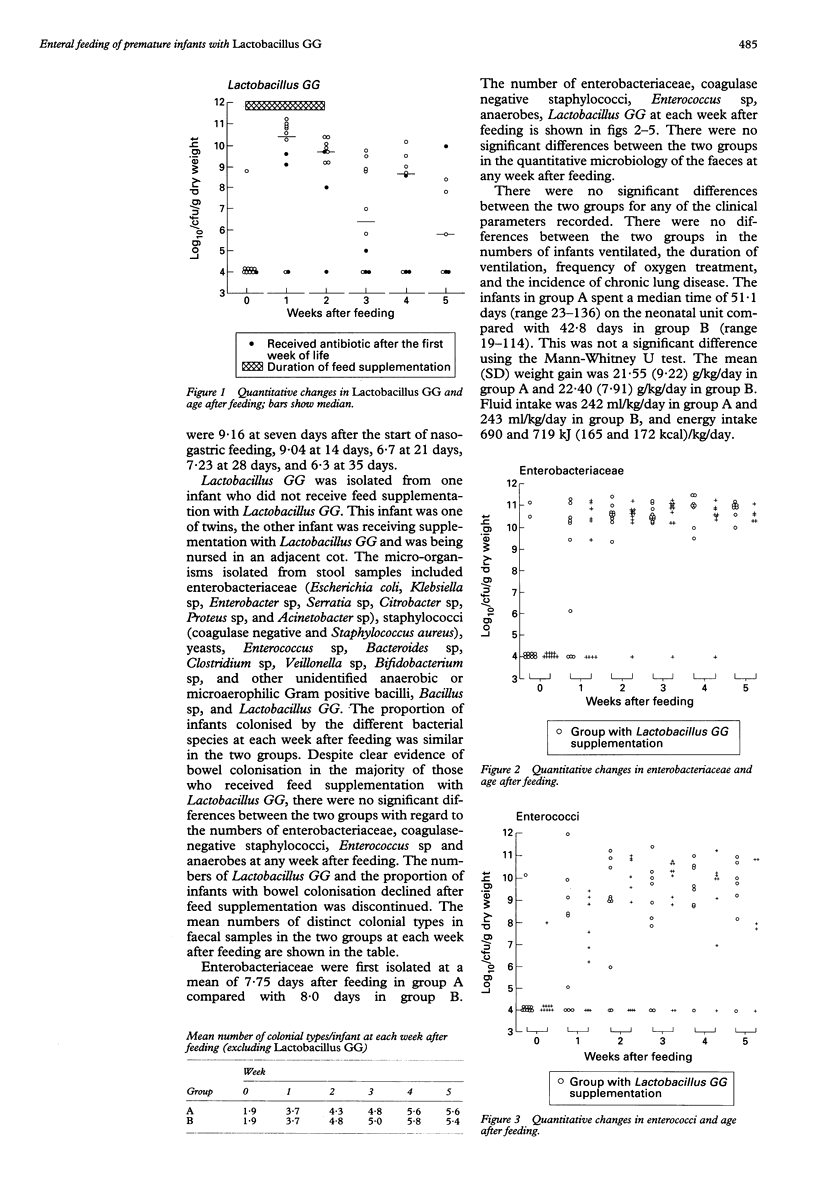
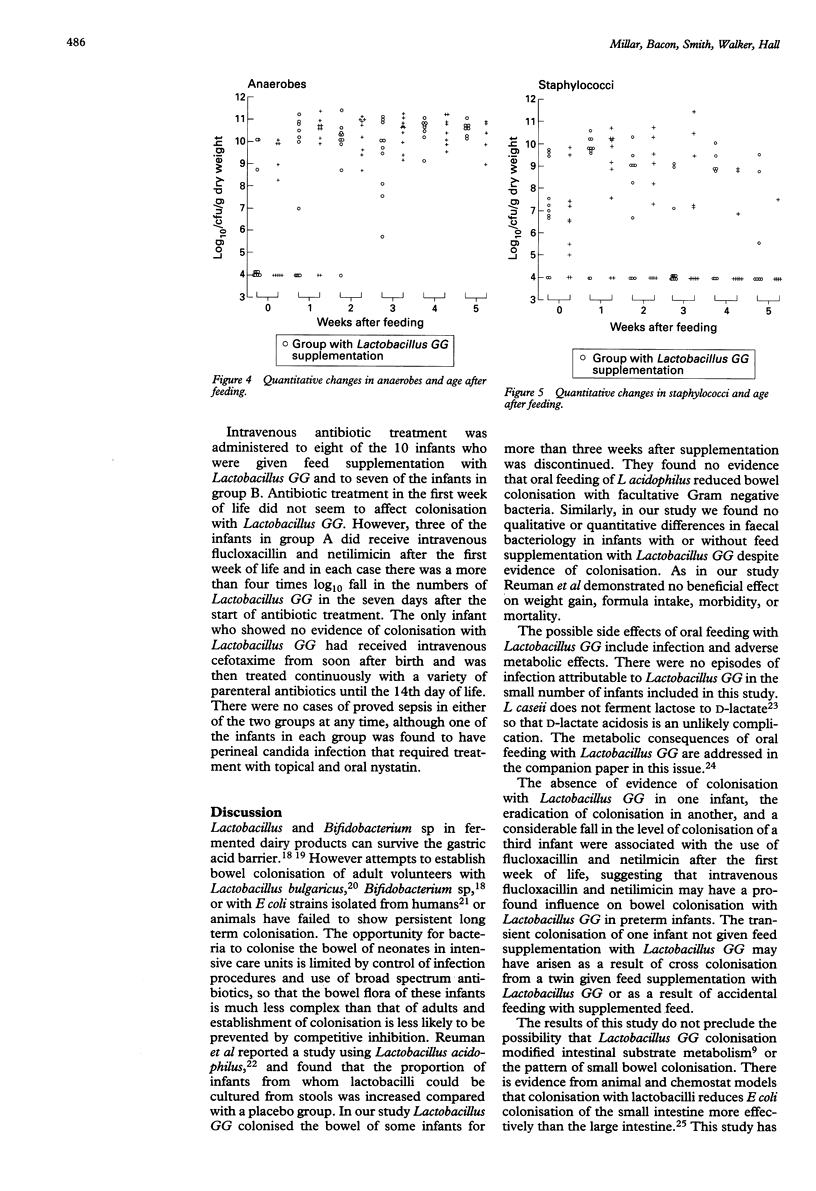
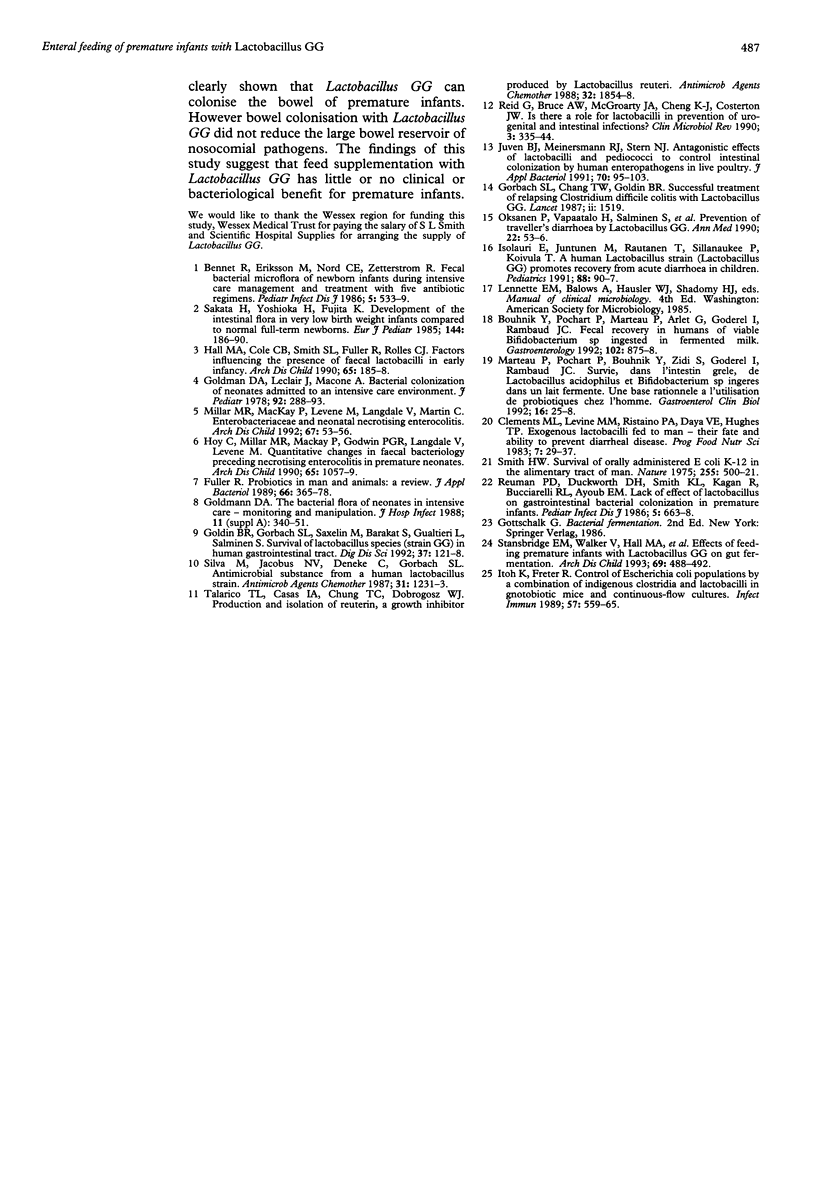
Selected References
These references are in PubMed. This may not be the complete list of references from this article.
- Bennet R., Eriksson M., Nord C. E., Zetterström R. Fecal bacterial microflora of newborn infants during intensive care management and treatment with five antibiotic regimens. Pediatr Infect Dis. 1986 Sep-Oct;5(5):533–539. doi: 10.1097/00006454-198609000-00009. [DOI] [PubMed] [Google Scholar]
- Bouhnik Y., Pochart P., Marteau P., Arlet G., Goderel I., Rambaud J. C. Fecal recovery in humans of viable Bifidobacterium sp ingested in fermented milk. Gastroenterology. 1992 Mar;102(3):875–878. doi: 10.1016/0016-5085(92)90172-u. [DOI] [PubMed] [Google Scholar]
- Clements M. L., Levine M. M., Ristaino P. A., Daya V. E., Hughes T. P. Exogenous lactobacilli fed to man - their fate and ability to prevent diarrheal disease. Prog Food Nutr Sci. 1983;7(3-4):29–37. [PubMed] [Google Scholar]
- Fuller R. Probiotics in man and animals. J Appl Bacteriol. 1989 May;66(5):365–378. [PubMed] [Google Scholar]
- Goldin B. R., Gorbach S. L., Saxelin M., Barakat S., Gualtieri L., Salminen S. Survival of Lactobacillus species (strain GG) in human gastrointestinal tract. Dig Dis Sci. 1992 Jan;37(1):121–128. doi: 10.1007/BF01308354. [DOI] [PubMed] [Google Scholar]
- Goldmann D. A., Leclair J., Macone A. Bacterial colonization of neonates admitted to an intensive care environment. J Pediatr. 1978 Aug;93(2):288–293. doi: 10.1016/s0022-3476(78)80523-x. [DOI] [PubMed] [Google Scholar]
- Goldmann D. A. The bacterial flora of neonates in intensive care-monitoring and manipulation. J Hosp Infect. 1988 Feb;11 (Suppl A):340–351. doi: 10.1016/0195-6701(88)90209-5. [DOI] [PubMed] [Google Scholar]
- Gorbach S. L., Chang T. W., Goldin B. Successful treatment of relapsing Clostridium difficile colitis with Lactobacillus GG. Lancet. 1987 Dec 26;2(8574):1519–1519. doi: 10.1016/s0140-6736(87)92646-8. [DOI] [PubMed] [Google Scholar]
- Hall M. A., Cole C. B., Smith S. L., Fuller R., Rolles C. J. Factors influencing the presence of faecal lactobacilli in early infancy. Arch Dis Child. 1990 Feb;65(2):185–188. doi: 10.1136/adc.65.2.185. [DOI] [PMC free article] [PubMed] [Google Scholar]
- Hoy C., Millar M. R., MacKay P., Godwin P. G., Langdale V., Levene M. I. Quantitative changes in faecal microflora preceding necrotising enterocolitis in premature neonates. Arch Dis Child. 1990 Oct;65(10 Spec No):1057–1059. doi: 10.1136/adc.65.10_spec_no.1057. [DOI] [PMC free article] [PubMed] [Google Scholar]
- Isolauri E., Juntunen M., Rautanen T., Sillanaukee P., Koivula T. A human Lactobacillus strain (Lactobacillus casei sp strain GG) promotes recovery from acute diarrhea in children. Pediatrics. 1991 Jul;88(1):90–97. [PubMed] [Google Scholar]
- Itoh K., Freter R. Control of Escherichia coli populations by a combination of indigenous clostridia and lactobacilli in gnotobiotic mice and continuous-flow cultures. Infect Immun. 1989 Feb;57(2):559–565. doi: 10.1128/iai.57.2.559-565.1989. [DOI] [PMC free article] [PubMed] [Google Scholar]
- Juven B. J., Meinersmann R. J., Stern N. J. Antagonistic effects of lactobacilli and pediococci to control intestinal colonization by human enteropathogens in live poultry. J Appl Bacteriol. 1991 Feb;70(2):95–103. doi: 10.1111/j.1365-2672.1991.tb04433.x. [DOI] [PubMed] [Google Scholar]
- Marteau P., Pochart P., Bouhnik Y., Zidi S., Goderel I., Rambaud J. C. Survie, dans l'intestin grêle, de Lactobacillus acidophilus et Bifidobacterium sp, ingerés dans un lait fermenté. Une base rationnelle à l'utilisation de probiotiques chez l'homme. Gastroenterol Clin Biol. 1992;16(1):25–28. [PubMed] [Google Scholar]
- Millar M. R., MacKay P., Levene M., Langdale V., Martin C. Enterobacteriaceae and neonatal necrotising enterocolitis. Arch Dis Child. 1992 Jan;67(1 Spec No):53–56. doi: 10.1136/adc.67.1_spec_no.53. [DOI] [PMC free article] [PubMed] [Google Scholar]
- Oksanen P. J., Salminen S., Saxelin M., Hämäläinen P., Ihantola-Vormisto A., Muurasniemi-Isoviita L., Nikkari S., Oksanen T., Pörsti I., Salminen E. Prevention of travellers' diarrhoea by Lactobacillus GG. Ann Med. 1990 Feb;22(1):53–56. doi: 10.3109/07853899009147242. [DOI] [PubMed] [Google Scholar]
- Reid G., Bruce A. W., McGroarty J. A., Cheng K. J., Costerton J. W. Is there a role for lactobacilli in prevention of urogenital and intestinal infections? Clin Microbiol Rev. 1990 Oct;3(4):335–344. doi: 10.1128/cmr.3.4.335. [DOI] [PMC free article] [PubMed] [Google Scholar]
- Reuman P. D., Duckworth D. H., Smith K. L., Kagan R., Bucciarelli R. L., Ayoub E. M. Lack of effect of Lactobacillus on gastrointestinal bacterial colonization in premature infants. Pediatr Infect Dis. 1986 Nov-Dec;5(6):663–668. doi: 10.1097/00006454-198611000-00013. [DOI] [PubMed] [Google Scholar]
- Sakata H., Yoshioka H., Fujita K. Development of the intestinal flora in very low birth weight infants compared to normal full-term newborns. Eur J Pediatr. 1985 Jul;144(2):186–190. doi: 10.1007/BF00451911. [DOI] [PubMed] [Google Scholar]
- Silva M., Jacobus N. V., Deneke C., Gorbach S. L. Antimicrobial substance from a human Lactobacillus strain. Antimicrob Agents Chemother. 1987 Aug;31(8):1231–1233. doi: 10.1128/aac.31.8.1231. [DOI] [PMC free article] [PubMed] [Google Scholar]
- Smith H. W. Survival of orally administered E. coli K 12 in alimentary tract of man. Nature. 1975 Jun 5;255(5508):500–502. doi: 10.1038/255500a0. [DOI] [PubMed] [Google Scholar]
- Stansbridge E. M., Walker V., Hall M. A., Smith S. L., Millar M. R., Bacon C., Chen S. Effects of feeding premature infants with Lactobacillus GG on gut fermentation. Arch Dis Child. 1993 Nov;69(5 Spec No):488–492. doi: 10.1136/adc.69.5_spec_no.488. [DOI] [PMC free article] [PubMed] [Google Scholar]
- Talarico T. L., Casas I. A., Chung T. C., Dobrogosz W. J. Production and isolation of reuterin, a growth inhibitor produced by Lactobacillus reuteri. Antimicrob Agents Chemother. 1988 Dec;32(12):1854–1858. doi: 10.1128/aac.32.12.1854. [DOI] [PMC free article] [PubMed] [Google Scholar]


